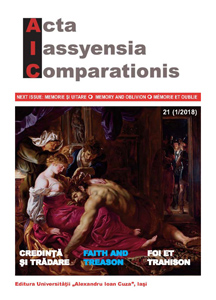Fenomenologia unei iluzii a non‐individualismului: trădarea în basmul popular românesc
Phenomenology of An Illusion of Non‐Individualism: Betrayal in Romanian Folktales
Author(s): Costel CioancăSubject(s): Comparative Study of Literature
Published by: Editura Universităţii »Alexandru Ioan Cuza« din Iaşi
Keywords: Treason; Romanian fairytales; morality; phenomenology;
Summary/Abstract: Although frequently present in Romanian folklore (just like in the imaginary of any community) as a broken taboo, so far betrayal has not been intensely researched in this particular context. In Romanian folktales betrayal brings to the fore one’s self-consciousness and one’s chosen way of living one’s own life, as well as the collective perception (i.e., evaluation and sanctioning) of a behaviour that breaks (thus undermining) well-established social and moral norms. Besides its symbolic meaning, an act of betrayaldefinitely has a hermeneutic value too, since it involves destructuring – restructuring of a certain status quo.From the phenomenology of evil in Romanian folktales (the subject of a book I am working at) I selected several aspects – namely: establishing of the truth; the final ordeals; the motif of the treacherous mother/ sister/ wife – which I analyze in the present study, seeking to determine: how and why, at some point, archaic/traditional family relationships cease to be functional because of an act of betrayal; what symbolic functions and significance betrayal has in folktales; how and why the hero’s or another actant’s body bears the consequences (settling the problem) of betrayal acts.
Journal: Acta Iassyensia Comparationis
- Issue Year: 1/2018
- Issue No: 21
- Page Range: 13-22
- Page Count: 10
- Language: Romanian

